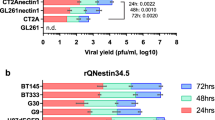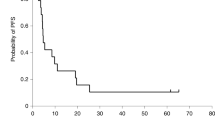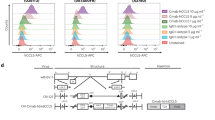Abstract
Current therapy for multiple myeloma is complex and prolonged. Antimyeloma drugs are combined in induction, consolidation and/or maintenance protocols to destroy bulky disease, then suppress or eradicate residual disease. Oncolytic viruses have the potential to mediate both tumor debulking and residual disease elimination, but this curative paradigm remains unproven. Here, we engineered an oncolytic vesicular stomatitis virus to minimize its neurotoxicity, enhance induction of antimyeloma immunity and facilitate noninvasive monitoring of its intratumoral spread. Using high-resolution imaging, autoradiography and immunohistochemistry, we demonstrate that the intravenously administered virus extravasates from tumor blood vessels in immunocompetent myeloma-bearing mice, nucleating multiple intratumoral infectious centers that expand rapidly and necrose at their centers, ultimately coalescing to cause extensive tumor destruction. This oncolytic tumor debulking phase lasts only for 72 h after virus administration, and is completed before antiviral antibodies become detectable in the bloodstream. Antimyeloma T cells, cross-primed as the virus-infected cells provoke an antiviral immune response, then eliminate residual uninfected myeloma cells. The study establishes a curative oncolytic paradigm for multiple myeloma where direct tumor debulking and immune eradication of minimal disease are mediated by a single intravenous dose of a single therapeutic agent. Clinical translation is underway.
This is a preview of subscription content, access via your institution
Access options
Subscribe to this journal
Receive 12 print issues and online access
$259.00 per year
only $21.58 per issue
Buy this article
- Purchase on SpringerLink
- Instant access to full article PDF
Prices may be subject to local taxes which are calculated during checkout





Similar content being viewed by others
References
Rajkumar SV . Multiple myeloma: 2012 update on diagnosis, risk-stratification, and management. Am J Hematol 2012; 87: 78–88.
Jemal A, Siegel R, Xu J, Ward E . Cancer statistics, 2010. CA Cancer J Clin 2010; 60: 277–300.
Zhou Y, Barlogie B, Shaughnessy JD . The molecular characterization and clinical management of multiple myeloma in the post-genome era. Leukemia 2009; 23: 1941–1956.
Kumar SK, Mikhael JR, Buadi FK, Dingli D, Dispenzieri A, Fonseca R et al. Management of newly diagnosed symptomatic multiple myeloma: updated Mayo Stratification of Myeloma and Risk-Adapted Therapy (mSMART) consensus guidelines. Mayo Clin Proc 2009; 84: 1095–1110.
Schlude C, Beckhove P . Immunology and immunotherapeutic approaches in multiple myeloma. Recent Results Cancer Res 2011; 183: 97–109.
Liu TC, Galanis E, Kirn D . Clinical trial results with oncolytic virotherapy: a century of promise, a decade of progress. Nat Clin Pract Oncol 2007; 4: 101–117.
Russell SJ, Peng KW . Viruses as anticancer drugs. Trends Pharmacol Sci 2007; 28: 326–333.
Thirukkumaran CM, Morris DG . Oncolytic virotherapy for multiple myeloma: past, present, and future. Bone Marrow Res 2011; 2011, Article ID 632948.
Kelly E, Russell SJ . History of oncolytic viruses: genesis to genetic engineering. Mol Ther 2007; 15: 651–659.
Melcher A, Parato K, Rooney CM, Bell JC . Thunder and lightning: immunotherapy and oncolytic viruses collide. Mol Ther 2011; 19: 1008–1016.
Shafren DR, Au GG, Nguyen T, Newcombe NG, Haley ES, Beagley L et al. Systemic therapy of malignant human melanoma tumors by a common cold-producing enterovirus, coxsackievirus a21. Clin Cancer Res 2004; 10(1 Pt 1) 53–60.
Wojton J, Kaur B . Impact of tumor microenvironment on oncolytic viral therapy. Cytokine Growth Factor Rev 2010; 21: 127–134.
Yu YA, Galanis C, Woo Y, Chen N, Zhang Q, Fong Y et al. Regression of human pancreatic tumor xenografts in mice after a single systemic injection of recombinant vaccinia virus GLV-1h68. Mol Cancer Ther 2009; 8: 141–151.
Dingli D, Peng KW, Harvey ME, Greipp PR, O'Connor MK, Cattaneo R et al. Image-guided radiovirotherapy for multiple myeloma using a recombinant measles virus expressing the thyroidal sodium iodide symporter. Blood 2004; 103: 1641–1646.
Tai CK, Kasahara N . Replication-competent retrovirus vectors for cancer gene therapy. Front Biosci 2008; 13: 3083–3095.
Bridle BW, Hanson S, Lichty BD . Combining oncolytic virotherapy and tumour vaccination. Cytokine Growth Factor Rev 2010; 21: 143–148.
Prestwich RJ, Harrington KJ, Pandha HS, Vile RG, Melcher AA, Errington F . Oncolytic viruses: a novel form of immunotherapy. Expert Rev Anticancer Ther 2008; 8: 1581–1588.
Tong AW, Senzer N, Cerullo V, Templeton NS, Hemminki A, Nemunaitis J . Oncolytic viruses for induction, of anti-tumor immunity. Curr Pharm Biotechnol 2011, e-pub of print 8 July 2011 PMID 21740355.
Chiocca EA . The host response to cancer virotherapy. Curr Opin Mol Ther 2008; 10: 38–45.
Guo ZS, Parimi V, O'Malley ME, Thirunavukarasu P, Sathaiah M, Austin F et al. The combination of immunosuppression and carrier cells significantly enhances the efficacy of oncolytic poxvirus in the pre-immunized host. Gene Ther 2010; 17: 1465–1475.
Castelo-Branco P, Passer BJ, Buhrman JS, Antoszczyk S, Marinelli M, Zaupa C et al. Oncolytic herpes simplex virus armed with xenogeneic homologue of prostatic acid phosphatase enhances antitumor efficacy in prostate cancer. Gene Ther 2010; 17: 805–810.
Lichty BD, Stojdl DF, Taylor RA, Miller L, Frenkel I, Atkins H et al. Vesicular stomatitis virus: a potential therapeutic virus for the treatment of hematologic malignancy. Hum Gene Ther 2004; 15: 821–831.
Goel A, Carlson SK, Classic KL, Greiner S, Naik S, Power AT et al. Radioiodide imaging and radiovirotherapy of multiple myeloma using VSV(Delta51)-NIS, an attenuated vesicular stomatitis virus encoding the sodium iodide symporter gene. Blood 2007; 110: 2342–2350.
Hadaschik BA, Zhang K, So AI, Fazli L, Jia W, Bell JC et al. Oncolytic vesicular stomatitis viruses are potent agents for intravesical treatment of high-risk bladder cancer. Cancer Res 2008; 68: 4506–4510.
Wu L, Huang TG, Meseck M, Altomonte J, Ebert O, Shinozaki K et al. rVSV(M Delta 51)-M3 is an effective and safe oncolytic virus for cancer therapy. Hum Gene Ther 2008; 19: 635–647.
Wollmann G, Rogulin V, Simon I, Rose JK, van den Pol AN . Some attenuated variants of vesicular stomatitis virus show enhanced oncolytic activity against human glioblastoma cells relative to normal brain cells. J Virol 2010; 84: 1563–1573.
Stewart JH, Ahmed M, Northrup SA, Willingham M, Lyles DS . Vesicular stomatitis virus as a treatment for colorectal cancer. Cancer Gene Ther 2011; 18: 837–849.
Obuchi M, Fernandez M, Barber GN . Development of recombinant vesicular stomatitis viruses that exploit defects in host defense to augment specific oncolytic activity. J Virol 2003; 77: 8843–8856.
Obuchi M, Fernandez M, Barber GN . Development of recombinant vesicular stomatitis viruses that exploit defects in host defense to augment specific oncolytic activity. J Virol 2003; 77: 8843–8856.
Schnell MJ, Buonocore L, Whitt MA, Rose JK . The minimal conserved transcription stop-start signal promotes stable expression of a foreign gene in vesicular stomatitis virus. J Virol 1996; 70: 2318–2323.
Whelan SP, Ball LA, Barr JN, Wertz GT . Efficient recovery of infectious vesicular stomatitis virus entirely from cDNA clones. Proc Natl Acad Sci U S A 1995; 92: 8388–8392.
Penheiter AR, Wegman TR, Classic KL, Dingli D, Bender CE, Russell SJ et al. Sodium iodide symporter (NIS)-mediated radiovirotherapy for pancreatic cancer. Am J Roentgenol 2010; 195: 341–349.
Le Bon A, Tough DF . Type I interferon as a stimulus for cross-priming. Cytokine Growth Factor Rev 2008; 19: 33–40.
Bodo G, Palese P, Lindner J. . Activity of mouse interferon in human cells. Proc Soc Exp Biol Med 1971; 137: 1392–1395.
Stewart WE, Havell EA . Characterization of a subspecies of mouse interferon cross-reactive on human cells and antigenically related to human leukocyte interferon. Virology 1980; 101: 315–318.
Lichty BD, Stojdl DF, Taylor RA, Miller L, Frenkel I, Atkins H et al. Vesicular stomatitis virus: a potential therapeutic virus for the treatment of hematologic malignancy. Hum Gene Ther 2004; 15(9) 821–831.
Oyajobi BO, Franchin G, Williams PJ, Pulkrabek D, Gupta A, Munoz S et al. Dual effects of macrophage inflammatory protein-1alpha on osteolysis and tumor burden in the murine 5TGM1 model of myeloma bone disease. Blood 2003; 102: 311–319.
Turner J, Tan J, Crucian B, Sullivan D, Ballester O, Dalton W et al. Broadened clinical utility of gene gun-mediated, granulocyte-macrophage colon-stimulating factor cDNA-based tumor cell vaccines as demonstrated with a mouse myeloma model. Human Gene Therapy 1998; 9: 1121–1130.
Majid AM, Ezelle H, Shah S, Barber GN . Evaluating replication-defective vesicular stomatitis virus as a vaccine vehicle. J Virol 2006; 80: 6993–7008.
Power AT, Wang J, Falls TJ, Paterson JM, Parato KA, Lichty BD et al. Carrier cell-based delivery of an oncolytic virus circumvents antiviral immunity. Mol Ther 2007; 15: 123–130.
Hervas-Stubbs S, Perez-Gracia JL, Rouzaut A, Sanmamed MF, Le Bon A, Melero I. . Direct effects of type I interferons on cells of the immune system. Clin Cancer Res 2011; 17: 2619–2627.
Taylor KL, Leaman DW, Grane R, Mechti N, Borden EC, Lindner DJ . Identification of interferon-beta-stimulated genes that inhibit angiogenesis in vitro. J Interferon Cytokine Res 2008; 28: 733–740.
Stojdl DF, Lichty BD, tenOever BR, Paterson JM, Power AT, Knowles S et al. VSV strains with defects in their ability to shutdown innate immunity are potent systemic anti-cancer agents. Cancer Cell 2003; 4: 263–275.
Dingli D, Diaz RM, Bergert ER, O'Connor MK, Morris JC, Russell SJ . Genetically targeted radiotherapy for multiple myelo. Blood 2003; 102: 489–496.
Conzelmann KK. . Nonsegmented negative-strand RNA viruses: genetics and manipulation of viral genomes. Annu Rev Genet 1998; 32: 123–162.
Garcia-Sastre A, Biron CA . Type 1 interferons and the virus-host relationship: a lesson in detente. Science 2006; 312: 879–882.
Guidotti LG, Chisari FV . Noncytolytic control of viral infections by the innate and adaptive immune response. Annu Rev Immunol 2001; 19: 65–91.
von Kobbe C, van Deursen JM, Rodrigues JP, Sitterlin D, Bachi A, Wu X et al. Vesicular stomatitis virus matrix protein inhibits host cell gene expression by targeting the nucleoporin Nup98. Mol Cell 2000; 6: 1243–1252.
Jenks N, Myers R, Greiner SM, Thompson J, Mader EK, Greenslade A et al. Safety studies on intrahepatic or intratumoral injection of oncolytic vesicular stomatitis virus expressing interferon-beta in rodents and nonhuman primates. Hum Gene Ther 2010; 21: 451–462.
Saloura V, Wang LC, Fridlender ZG, Sun J, Cheng G, Kapoor V et al. Evaluation of an attenuated vesicular stomatitis virus vector expressing interferon-beta for use in malignant pleural mesothelioma: heterogeneity in interferon responsiveness defines potential efficacy. Hum Gene Ther 2010; 21: 51–64.
Balachandran S, Barber GN . Defective translational control facilitates vesicular stomatitis virus oncolysis. Cancer Cell 2004; 5: 51–65.
Natsume A, Mizuno M, Ryuke Y, Yoshida J . Antitumor effect and cellular immunity activation by murine interferon-beta gene transfer against intracerebral glioma in mouse. Gene Ther 1999; 6: 1626–1633.
Saito R, Mizuno M, Nakahara N, Tsuno T, Kumabe T, Yoshimoto T et al. Vaccination with tumor cell lysate-pulsed dendritic cells augments the effect of IFN-beta gene therapy for malignant glioma in an experimental mouse intracranial glioma. Int J Cancer 2004; 111: 777–782.
Shibata S, Okano S, Yonemitsu Y, Onimaru M, Sata S, Nagata-Takeshita H et al. Induction of efficient antitumor immunity using dendritic cells activated by recombinant Sendai virus and its modulation by exogenous IFN-beta gene. J Immunol 2006; 177: 3564–3576.
Ria R, Roccaro AM, Merchionne F, Vacca A, Dammacco F, Ribatti D . Vascular endothelial growth factor and its receptors in multiple myeloma. Leukemia 2003; 17: 1961–1966.
Peng KW, Dogan A, Vrana J, Liu C, Ong HT, Kumar S et al. Tumor-associated macrophages infiltrate plasmacytomas and can serve as cell carriers for oncolytic measles virotherapy of disseminated myeloma. Am J Hematol 2009; 84: 401–407.
Liberati AM, Cinieri S, Senatore MG, Portuesi MG, De Angelis V, Di Clemente F et al. Phase I-II trial on natural beta interferon in chemoresistant and relapsing multiple myeloma. Haematologica 1990; 75: 436–442.
Acknowledgements
This work was supported by funds from Mayo Clinic, NIH/NCI (R01 CA100634 and R01 CA129966), the Richard M Schulze Family Foundation and a gift from Al and Mary Agnes McQuinn. We are grateful to Guy Griesmann and Sharon Stephan in the Viral Vector Production Laboratory (Mayo Clinic), Theresa Decklever (Department of Nuclear Medicine) and Wendy Ferguson (Mayo Clinic) for their technical assistance.
Author information
Authors and Affiliations
Corresponding author
Ethics declarations
Competing interests
The authors declare no conflict of interest.
Additional information
Supplementary Information accompanies the paper on the Leukemia website
Rights and permissions
About this article
Cite this article
Naik, S., Nace, R., Federspiel, M. et al. Curative one-shot systemic virotherapy in murine myeloma. Leukemia 26, 1870–1878 (2012). https://doi.org/10.1038/leu.2012.70
Received:
Revised:
Accepted:
Published:
Issue Date:
DOI: https://doi.org/10.1038/leu.2012.70
Keywords
This article is cited by
-
CD19-targeted BiTE expression by an oncolytic vaccinia virus significantly augments therapeutic efficacy against B-cell lymphoma
Blood Cancer Journal (2022)
-
Harnessing cancer immunotherapy during the unexploited immediate perioperative period
Nature Reviews Clinical Oncology (2020)
-
Recombinant viruses with other anti-cancer therapeutics: a step towards advancement of oncolytic virotherapy
Cancer Gene Therapy (2018)
-
Robust Oncolytic Virotherapy Induces Tumor Lysis Syndrome and Associated Toxicities in the MPC-11 Plasmacytoma Model
Molecular Therapy (2016)
-
Perfusion Pressure Is a Critical Determinant of the Intratumoral Extravasation of Oncolytic Viruses
Molecular Therapy (2016)



